DC Cabbies Block Streets to Protest Lyft and Uber
http://nypost.com/2014/02/26/taxi-medallion-auctioned-for-record-setting-965000/
http://nypost.com/2014/02/26/taxi-medallion-auctioned-for-record-setting-965000/
CBS DC (“D.C. Cab Drivers Choke Streets To Protest Rideshare Companies“):
D.C. cab drivers blared their horns and blocked traffic for blocks near the city’s municipal office building Wednesday to protest rideshare companies like Lyft and Uber.
The companies are app-based, and customers use smartphones to “hail” drivers who use their own personal vehicles for pickup. They do not operate under the same city regulations that govern taxis..
The D.C. Taxi Drivers “Teamsters” union issued a press release Wednesday claiming that the rideshare companies “are operating illegally in the city and are stealing work from D.C. taxi drivers.”
[…]
As part of the protest, the president of Local 922 delivered a letter to D.C. Mayor Vincent Gray and city councilmembers demanding that the city follow Virginia’s example and order the companies to cease operations until a fair regulation resolution is reached.
“It’s ironic that taxi companies have congregated on Freedom Plaza, when they refuse to accept the freedom of choice, flexibility and economic opportunity that the Uber platform provides thousands of partners and riders across the city,” Uber wrote in a statement about the protest.
While it might surprise regular readers, I’m quite sympathetic to the cabbies on this one.
I’ve never used Lyft or Uber, but have heard great things about their service. Further, while I haven’t used one since starting my current job last August, I’ve been a frequent customer of DC taxis and find them appallingly bad. They’re by far the worst-quality fleet of vehicles of any cabs I’ve ever utilized, and I’ve been in taxis in the Third World. And my natural instincts are to side with the free market, which again tilts against the cabbies here.
But the fact of the matter is that the “ride share” services are operating a taxi service in DC in illegal competition with those who are playing by the established rules. While I think the whole notion of a city-mandated scarcity of cabs for the purposes of establishing a monopoly is generally a bad thing, that’s the current system and those driving legal cabs in DC paid a lot of money to be able to do so. It’s not right that they should have to compete for fares against people without that sunk cost.
It’s similar to my position on the efforts by brick and mortar restaurants to ban food trucks, which I wrote about several years ago:
I’m not a fan of rent seeking of this sort but can at least understand why tax paying restaurateurs would organize against competitors who are given relatively preferential treatment by the state. It would seem, though, that the construction of this law is too broad. Why not simply require comparable licensing for “permanent” mobile establishments and stationary restaurants? Or restrict the application of the law as currently written only to trucks operating within, say, a half mile of a fixed facility?
If services like Lyft and Uber are here to stay, I’m all for incorporating them into the system. But they should have to pay the same sort of taxes as other business operating in a city and play by the same rules as more traditional taxi companies. I’m happy to see such absurdities as New York’s medallion system, where would-be cab operators have to pay as much as $965,000 for the privilege, go away. But if it’s going to, those who’ve paid ought to get a prorated refund or otherwise made whole.
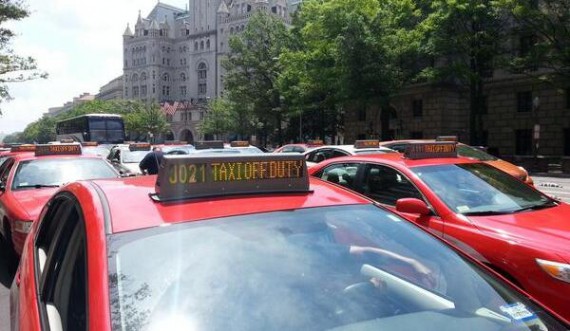

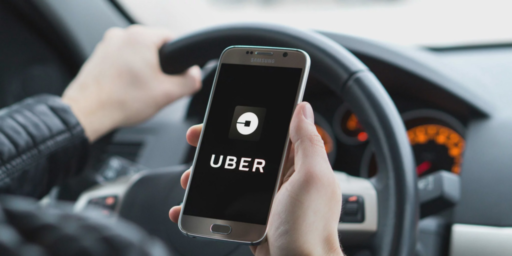
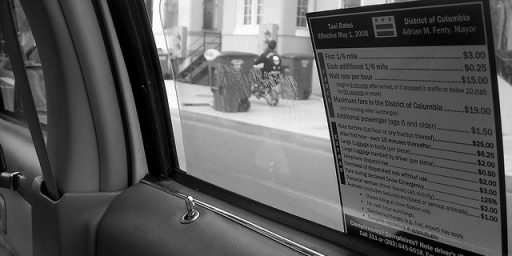
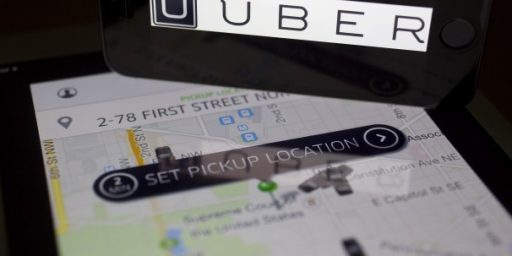
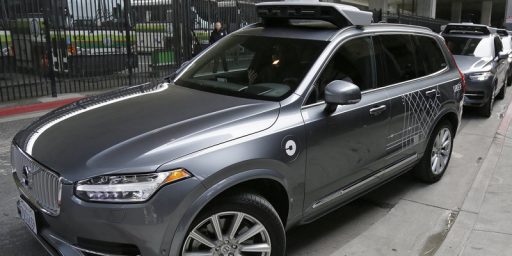
If this means I’m not stuck in a DC cab forced to listen to NPR, I am a huge Uber and Lyft fan!
How about insurance, Dr. Joyner?
Most personal auto policies become null and void if you use your car as a Taxi or Livery Vehicle. Most people don’t know that everytime they get into an Uber car, they’re basically uninsured unless the driver has gotten a very specific insurance policy that allows him to use his car as a business.
Furthermore, Uber, in their Terms of Service, make it clear that they’re a foreign company and that the drivers are all independent contractors, and if you have any issues, it’s with the driver, not Uber and they can’t be of any help. Read it yourself. It’s a travesty.
It’s all going to be great, until the first person dies – and one will at some point; it’s just the law of averages.
I disagree with your reasoning here. If you don’t think that government mandated scarcity is correct, then how does the problem ever get solved? If you remove the artificial scarcity (which I believe you’d prefer), then the cost of the medallions will sink from their current stupid high price to zero, and they’re out the money they spent on it anyway.
Unless the City (read taxpayers) refund the medallion cost once the regulations are removed (and since when does a government refund money like that), they are really gambling on this one, and sometimes when you gamble, you lose.
I disagree that taxi cabs and Uber compete unfairly. Yes, regulation needs to catch up by making sure Uber drivers are properly insured, but cabs still have a huge advantage in that they can pick up customers at wait points what is impossible under the Uber model. And if Uber brings down the cab license bubble, even better. There shouldn’t be a “guaranteed to rise in price” item due to government controlled artificial scarcity.
@EddieInCA: Uber requires insurance and provides (at the drivers expense) required insurance.
From Uber
“From the time a driver accepts a trip request through our app until the completion of the ride, our partners have $1 million of coverage for driver liability. We were also the first ridesharing request service to include $1 million of coverage for uninsured/underinsured motorists, meaning that passengers and drivers are also covered for injuries when another party is at fault and lacks sufficient insurance. This $1 million coverage from trip acceptance to drop-off is consistent across cities. This coverage kicks in regardless of whether the driver’s personal insurance applies to the trip. We have also added contingent comprehensive and collision insurance during trips, up to $50,000/incident with a $1,000 deductible.”
https://blog.uber.com/uberXridesharinginsurance
Disclosure. I’ve used Uber in several cities and was very happy.
Also it’s not really fair to say Uber completes with Cabs. You can’t hail an Uber vehicle from a sidewalk as you can a cab.
@Davebo:
From your link:
That’s not even enough coverage for a used Lexus.
Case in point with real-life consequences:
http://blogs.kqed.org/newsfix/2014/03/25/draft-uber-insurance-policy/
Regardless of whether or not ride sharing is a good idea, inconveniencing the entire public while simultaneously making them aware of exactly who they can take their business to in order to most effectively retaliate is probably not a good strategy for fighting it:
Uber registrations jump 850 percent in London, as cabbie protests cripple traffic
I really wish police departments would crack down on the illegal ride-sharing services. Just start arresting the drivers and impounding the cars.
UberX and Lyft are knowing and willfully breaking the law. The hell with them, just destroy them.
A functioning cab system is part of a cities overall transportation infrastructure, along with public transportation, private cars, tolled bridges etc. The reason that there are lots of very expensive regulations in place for cabs is that there is a need to ensure that they are available to meet the needs of the city as a whole, not just the individual rider.
It’s not something that should be disrupted willy-nilly because the UberX and Lyft owners have figured out how to get the profits from a taxi-like system without paying the costs or ever owning any actual cars.
@Stormy Dragon:
As always, what Uber doesn’t tell anyone is what their numbers are. The registrations jump 850%, but from what?
I agree and disagree with different pieces of James argument here.
I disagree that medallion owners should be protected against loss of value due to changing regulations. Unless the city guaranteed that the medallion scheme would be in place forever, then they have the right to change it. Those who drove the prices to exorbitant levels on speculation that nothing would ever change will have to eat the cost.
I agree with James that Uber is a taxi service and should have to comply with all regulations that a taxi service has to. If that means removing regulations from all, all the better.
@MarkedMan: I agree that government doesn’t owe compensation for losses on the speculatively bidded medallions. I think the medallions it sold directly to cabbies, however, are a different matter. I presume there’s a contract in place guaranteeing them some sort of exclusive rights for the period of time that they’ve purchased the medallion. If not, there’s certainly an implied contract.
We make all manner of major financial decisions based on government policy. When those policies change, we tend to phase them out to reduce the harm. So, for example, I’m enthusiastic about ending farm subsidies and inclined to end the home mortgage interest deduction. But I’d phase both out over a long time (maybe 20 years) for those currently affected.
@James Joyner: Basically, I agree with everything you said here, although I suspect it would be hard to legally differentiate between speculators and those who were buying so they can drive a cab. I think it is pretty safe to say that in NYC at least no one who is actually driving a cab has bought a new medallion in the past few years. People with a cool $1M in cash usually are not driving a cab.
So honor any contract, phase out the exclusivity over 5-10 years or whatever, and enforce whatever regulations remain on everyone.
THIS COMMENT HAS BEEN DELETED AS VIOLATING OUR SITE POLICIES. WE DO NOT PUBLISH CUT-AND-PASTE SCREEDS BY DRIVE-BY ACTIVISTS. I’VE DELETED SEVERAL OTHER COMMENTS IN THIS THREAD BY THE SAME POSTER. – JHJ
@Mu: I agree with this post. In fact I’m not sure it is really that far from James’ position. The regulations simply need to be updated for these new services. Yes, everybody involved will lobby to get their own set of advantages, but that’s pretty much how democracy and capitalism work.
@Nick: But why? If you think of the purchase of a medallion as a mechanism by which you invest your capital, isn’t this standard economic theory and the assumption of risk? Aren’t the medallion prices set by the free market?
It’s sort of like someone bitching about investing in Aereo stock. The possibility of regulation shift or grey areas in law being suddenly defined in a SCOTUS decision are always present. Either purchase insurance against the possibility or kwityerbitchin, I would think.
From my own viewpoint, I’d rather it be a bit more of a top-down decision, at least in urban areas. The city decides how many cabs it wants to have gumming up the streets, and issues that many medallions out on the free market at auction. Maybe they should require that the issuance of medallions require re-certification every so many years (eyesight check, not too many accidents, number of complaints, etc.) Remember, there is a bit of a Tragedy of the Commons aspect to it, since increasing the number of allowed taxis simply imposes the increased congestion across all drivers, rather than forcing it only on those who create it.
@grumpy realist: The potential problem with the city deciding “how many cabs it wants gumming up the streets” can be seen in Korea, particularly Seoul. With the advent of the World Cup games being shared by Japan and Korea, and the national employment scene reeling from a recent recession at the time, all of the major cities with WC venues minted taxi licenses to both ease unemployment and ensure that there would be enough taxis to meet demand. Fast forward a few years–now most cities have roughly twice the number of taxis that would be ideal for the transportation network, the government is passionately ambivalent about buying back licenses, and most drivers are ambivalent about giving up their means of livelihood anyway in a nation where the mandatory retirement age is 55 and the average taxi driver is well, 55 or so.
Expanding taxi service was welcomed by almost everyone at the time, but recently the glut of taxis in most cities makes it convenient for people such as myself–who can get a taxi by standing on a street corner waving for roughly 35 seconds, but bad for the taxi drivers–who often work 16 hours a day 6 or 7 days a week to make a bottom quartile living.
Unintended consequences are a beeyotch.